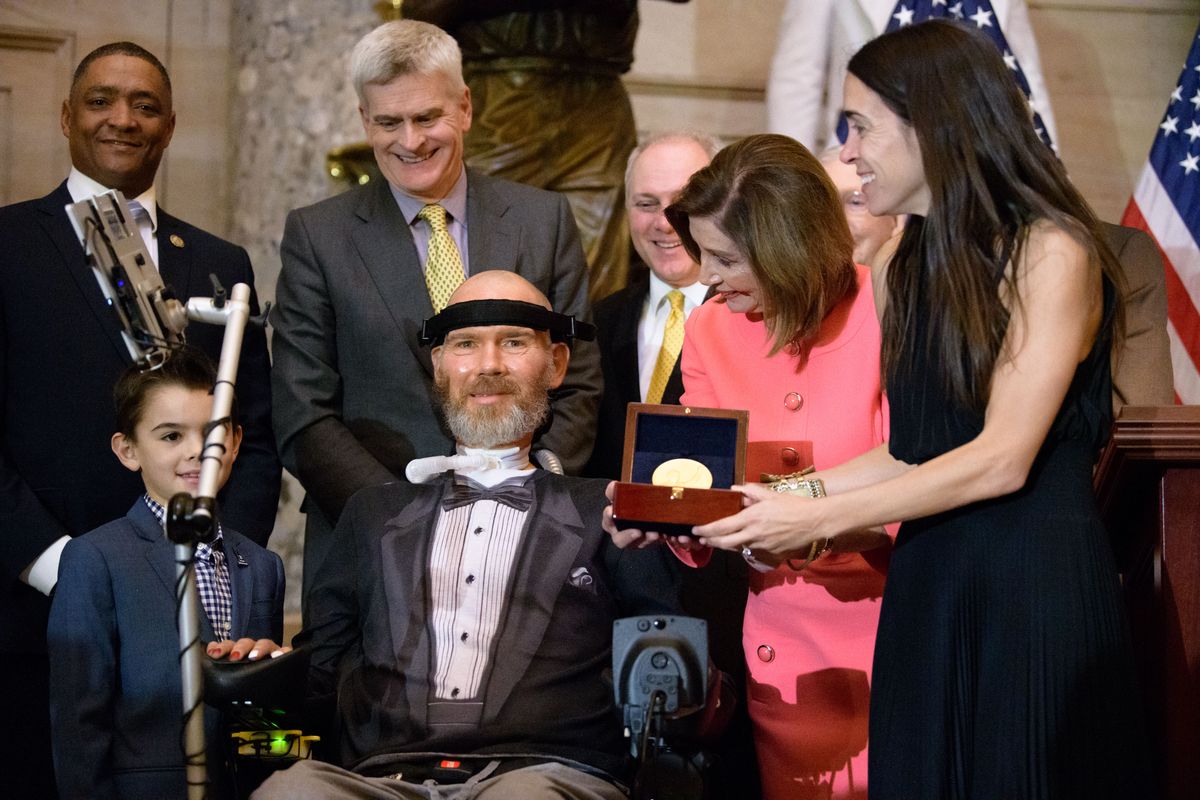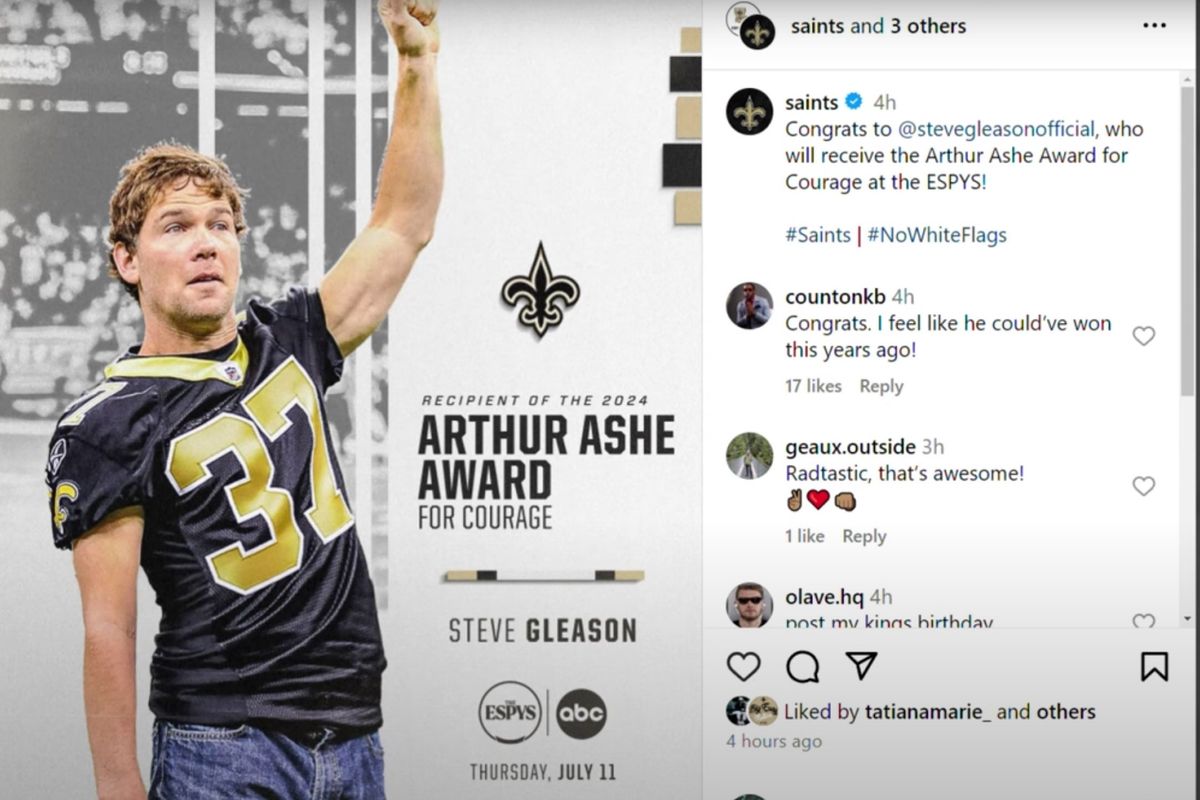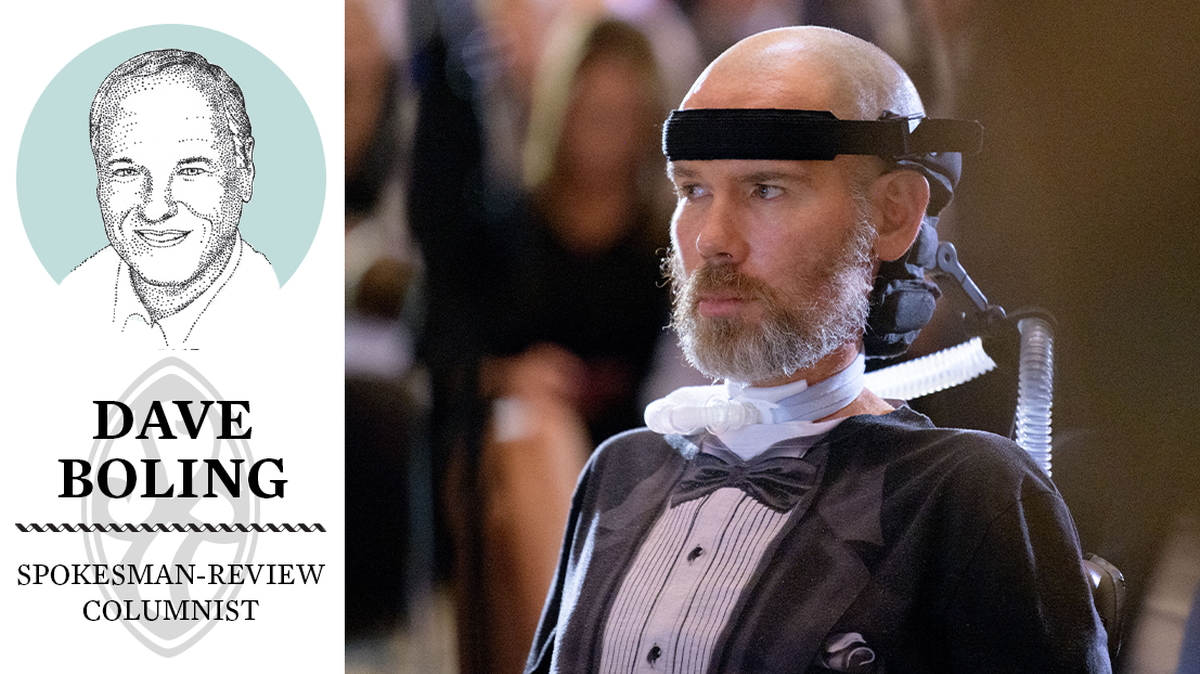At Northwest Passages event, Steve Gleason will share the pain and beauty of resiliency in the face of ALS battle: ‘He’s going to blow people’s minds’
Maybe you’ve been to author presentations.
But surely none like this.
This author, denied of motion, speech and breath by ALS, produced his 300-page book with the movement of his eyes.
Be assured, when each word is so precious, an author is obligated to fill them with meaning and power.
So, when Steve Gleason writes a phrase like, “My body is a prison,” it hits.
A standout athlete at Washington State and Gonzaga Prep, Gleason will appear at a Northwest Passages Book Club event Sunday at the Myrtle Woldson Performing Arts Center on the Gonzaga University campus.
Gleason’s wife, Michel, and collaborator/journalist Jeff Duncan also will appear.
This rare in-person event allows the audience to witness a synthesis of technology and human tenacity. A 47-year-old man, trapped inside a failed body, proves he’s still eager and able to share the products of a deeply inquisitive and philosophical mind.
Gleason’s book, “A Life Impossible,” is subtitled: “Living with ALS: Finding Peace and Wisdom Within a Fragile Existence.” That hints at the narrative arc of the book, that Gleason continues to search for answers with everything he has left.
“He’s going to blow people’s minds. I’ve never seen anything like it. When he gets in front of an audience, he captivates people,” Duncan said. “He just has an instinctual understanding of how to entertain people with self-deprecating humor and the power of his words.”
Eye-tracking technology on a computer transfers Gleason’s thoughts into a synthesized voice, tapping into a library of spoken words he recorded before ALS stole his voice.
Duncan explained that Gleason’s wheelchair features a computer tablet that bounces an infrared beam off his cornea back onto a screen at the point he fixes his gaze. “Steve has been at the forefront of using this since he started losing some ability to (type) with his hands.”
Ten years since going on a ventilator that breathes for him – extending his life with the help of constant caretaking – Gleason has far exceeded what he calls his “expiration date.”
The average life expectancy after an ALS diagnosis is two to five years. Baseball great Lou Gehrig died within two years of his famed diagnosis.
Gleason’s activism and fundraising on behalf of ALS causes has elicited countless honors, including the Congressional Gold Medal, the highest award given to a citizen. He is the only football player so honored, joining an esteemed list of fewer than 200 recipients (since 1776) that includes the likes of George Washington, Thomas Edison, Jackie Robinson, Rosa Parks and Neil Armstrong.
Perhaps the most highly honored of any native of Spokane, Gleason recently accepted the Arthur Ashe Courage award during the ESPY Awards broadcast on ESPN.
“The truth is, no human is immune from fear or adversity, not even super athletes, royal princes or the most holy saints,” Gleason told the ESPYs audience, his son, Rivers, at his side. “Considering this truth of our humanity, it’s vital that we all, individually and collectively, discover ways to be courageous and love the life we have.”
Gleason opens his book with a scene that captures a sense of profound helplessness: His young daughter, Gray, sits on the floor crying, while he sits immobile in his wheelchair.
“My body is a prison. I face insurmountable adversity each day, yet my family and I are able to survive and live within this miraculous, wonderful life. I have learned to accept things that are out of my control, to transform suffering into strength.”
Gleason takes you inside the literal life-threatening moments that can occur at any time, as when his caretakers move him into the shower. For roughly 90 seconds, his ventilator is removed.
“It’s like a practice of dying,” he writes. “I do not take one glorious, oxygen-rich, ineffable breath for granted.”
Duncan said it was important for Steve and Michel to openly recount the hardships ALS has put on their relationship.
“It’s so raw, which makes it even more heartbreaking,” Duncan said. “We were able to tell the whole love story leading up to ALS. … They had that perfect love, it seemed; that’s why it’s so hard to see what the disease does to really strong relationships.”
Somehow, Gleason still “has a great sense of humor,” Duncan said.
“(His mind is) totally clear, sharp as a tack, not affected at all. He has a keen awareness how awkward it is to try to engage with him, so he disarms people with his sense of humor.”
An inveterate iconoclast, Gleason wears his hair in a mohawk, sometimes dresses outrageously and enjoys pulling pranks.
Duncan said that Gleason dresses in scary outfits to New Orleans Saints home games that are scheduled nearest to Halloween. Once, he showed up with plastic wrap covering his entire face.
What makes it a scary joke is that Gleason breathes through a tracheostomy tube in his neck, not through his nose and mouth.
“It was obvious he couldn’t breathe,” Duncan said. “So, everybody was shocked.”
The book’s reviews have been strong. Kirkus Reviews writes: “A sobering, inspirational sports memoir grounded in inner strength and resiliency.”
Former teammate with the New Orleans Saints, quarterback Drew Brees, said: “Steve Gleason stands for hope, and he stands for infinite possibilities.”
Reviewers sometimes label mysteries and thrillers “un-put-down-able.” In contrast, “A Life Impossible” is a very put-down-able book. It almost mandates taking breaks.
I found myself pausing between chapters, and often rereading portions, taking time to feel the full depth of emotion Gleason brings to every page.
Author Buzz Bissinger, for the New York Times, cited Gleason as “a symbol of resilience, hope and optimism.” Although he added a caveat. “… but as I turned each page with one eye shut and the rest of my body cringing, my greatest takeaway is that my fear of ALS has only heightened. I am not Steve Gleason. I don’t have the strength.”
That’s a fair warning to some readers, perhaps. But it fails to recognize the great value of pioneers, pathfinders and heroes, those who face forbidding challenges so the rest of us might recalibrate our notion of life’s fullest possibilities.
Steve and Michel refuse to be called heroic, but that validates their authenticity. That’s how you can tell the real ones – they don’t see themselves as special, and certainly don’t invite that label.
So, don’t close one eye or cringe in fear when absorbing Gleason’s writing. This book isn’t meant as a reminder of your own shortcomings; it’s an inspiring postcard from the human frontier.
Take in every page wide-eyed and, as Gleason does, cherish every glorious, ineffable breath.
And if you come to his event, expect to be changed.


